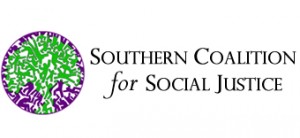America has 5% of the world’s total population by 25% of the world’s prisoners. 65 million people have a criminal record in the United States. Having a criminal conviction can trigger over 900 civil barriers including barriers to employment, housing and education.
At our July 12th Clean Slate Clinic we set up a camera and asked formerly incarcerated people to share their stories. This is what they told us.
People Change from SCSJ on Vimeo.
Reflections on the Clean Slate Clinic from an SCSJ Intern
A few staffers and I walked into the Holton Career Center early last Saturday to begin to set up for the day. There were around 20 or so soon-to-be clients that were waiting outside of the building before the event officially began. The people who came out early signaled that the services we are attempting to offer are needed in our community. More importantly, what was evident is that these people are not a passive group; the people are ready to take action to change the way they are viewed by their government, their communities and each other.
The Clean Slate Clinic was a multi-pronged approach aimed at helping the justice involved exercise agency. The registration process for the clinic helps SCSJ determine who is eligible for our services. After going through the clean slate process, clients were given two separate tickets, with one used as an opportunity to talk to a lawyer in a more personal setting about their justice-involved history and the other as a voucher for a free lunch later in the day. After receiving their tickets, clients went into the auditorium for a speech on the injustices of the criminal justice system.
Clients were shown two documentaries, the first called The House I Live In, detailing the state sponsored criminality and injustices involved in the War on Drugs. The House We Live In dealt more with socially constructed views on race. Information was also handed out to clients both inside and outside the auditorium about work that SCSJ has done with Ban the Box initiatives, empirical evidence of racial profiling by the Durham Police Department and steps the city has taken in hiring people with a criminal record since the box was banned in 2011. SCSJ also helped people tell their stories about their experiences with the criminal justice system.
Participants at the clinic were given information about local organizations that offer free help when it comes to critical life areas, such as education and job training, medical access and rent assistance. Members of the F.A.D.E. coalition were present and helped distribute information about their organizations work at changing local enforcement of drug related offences. SCSJ also partnered with SpiritHouse and Nicole Campbell of the Durham NAACP to register voters. The justice involved community is one of the hardest constituents to register to vote. This is because of the prevalence of misinformation people have about their rights to vote. We used this voter registration opportunity to let people know that once they complete their sentence, they are eligible to vote.
The Clinic’s main goal was to change the ways in which the justice involved participate in advocacy and politics. SpiritHouse helped facilitate a legislative exercise where clients introduced new laws that would help the justice involved earn a true clean slate. In meeting with attorneys and law clerks, clients were given a one on one meeting to let them know both the possibilities and limitations of what our organization can do to help clean their records.
Justice involved people are the reason for the work we do in criminal justice. To see over a hundred people throughout the day register for the clinic, dozens register to vote and many more take part in a legislative solution to their problems proves that those directly affected by injustice are those that have a solution for injustice.
Post by SCSJ Troan Intern Aaron Bryant.
Video by SCSJ Troan Intern Evey Wilson.
Written By Southern Coalition for Social Justice
People Change: Why Clean Slate Matters was originally published @ Southern Coalition for Social Justice and has been syndicated with permission.
Our authors want to hear from you! Click to leave a comment
Related Posts






